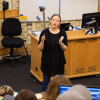A conference centring audiences was always going to be up our street at The Audience Agency and the AMA conference, Audiences at the Heart, didn't disappoint, delivering a jam-packed schedule of audience-centring content.
The Audience Agency was a lead sponsor for this year’s conference and delivered a keynote speech that plumbed the rich depths of over a decade of audience data in order to define and discuss the trends that are emerging for 'future audiences' as a new generation, shaped by unprecedented changes and world events, comes up through the ranks. You can catch up on our presentation here.
Reflecting on the unique perspective that being an evidence-driven organisation affords us at The Audience Agency, our Head of Networks, Rosanna Cant, had some useful observations:
| I enjoyed lots of conversations with delegates who were visiting our stand. A common theme to many of my chats was the fundamental difference between aiming/targeting marketing at audiences vs trying to understand them. The use of data plays such a critical role in the latter, yet it is remarkably low down on many arts marketing professionals to-do lists. Chatting in the coffee queue a fellow delegate clocked my lanyard and said “ah the data people, I need to talk to you I don’t do enough with my data but I don’t know where to start!”. Getting started with audience data is often the worst bit and, with the majority of the The Audience Agency team coming from arts venue backgrounds, we all sympathise. Every speaker I listened to at the AMA conference demonstrated brilliantly that it was possible to have big objectives but start small. The Bold and Brave examples of audience development we heard from the inspirational opening Keynote demonstrated that with clear objectives and a collective approach, it is much more possible to achieve great audience ambitions. |
The rest of our team up in Leeds all found the conference to be equally provoking, and have shared their top three takeaways for us to consider...
Adam Koszary, Head of Digital |
- The importance of leadership. The session with Mansfield District Council’s Sian Booth and Barking & Dagenham’s Zoinul Abidin was the highlight of the conference, with a refreshingly honest and funny insight into leadership. Leaders can get a bad rap, but this talk reinforced how honest, straightforward but visionary leadership can make the difference between a failing service and a service which can confidently face the future. You might need a special cupboard to cry in every now and then, but it’s still worth it.
- Yet another inflection point. It feels like we have one every year, but as audience changes from the pandemic, the rise of AI and the turmoil of social media continue apace it’s obvious that complacency – whether its in our programming or marketing – is a sure route to irrelevance. Forging the right path requires truly listening to and involving our audiences, and having the bold leadership to make the changes reflecting evolving audience tastes and behaviours.
- We have to fight apathy. You could sense some of the fatigue in the air – we’ve had over a decade of change, declining revenue and increasing demand to do more with less. While the conference theme of ‘audiences at the heart’ may seem obvious, we need to be reminded of who we’re in service of and be energised to meet their needs. That still requires structural change – whether that’s pivoting to digital realities, stronger cultures of evaluation, or hiring more marketers into leadership positions.
Dominique Triggs, Marketing and Communications Officer |
- The value of meeting IRL. This was my first AMA Conference, and it was great to see my colleagues in person and network with other arts marketers in the sector. Working remotely can be isolating sometimes, and having so many conversations in person gave me renewed energy and inspiration.
- A curiosity mindset. AI isn't all scary, and could be a great opportunity for arts marketers and as Jo Burnham’s AI introductory session reminded me, it’s important to go into it with a curiosity mindset.
- Everyone was a beginner once. Art Fund’s talk on their journey towards inclusive marketing was really interesting, emphasising the importance of not being afraid to be a beginner and to just get started.
Megan Tripp, Service and Community Manager |
- The importance of storytelling. Not just on stage or in a museum or gallery, but as a tool to help audiences engage with our organisations and understand what we're all about. And a technique to give a really memorable presentation at a conference!
- Go and get 'em. Despite lots of great work in recent years, there are still huge parts of the population who we're not reaching, and we need to keep working to really understand these communities. One speaker (I forget who), made the point 'would you go to a wedding of someone you'd never met?'. We have to go out and get to know people properly before inviting them in.
- Wellbeing isn't a luxury add-on. As the sector gets ever more pressured and challenging, we have to look after each other, and create supportive cultures in our workplaces, (not just offering the odd free yoga session!)
Oliver Mantell, Director of Evidence and Insight |
- Acknowledging AI's divisiveness. Useful suggestions from Jo Burnham about prompt engineering for AI (as well as quotes from lots of people in the sector about AI which gave a useful feel for the range of perspectives out there).
- Collaboration as true partnership. Keranjeet Kaur Virdee's comments on the process of collaboration between South Asian Arts UK and Opera North and the range of things to bear in mind to make the collaboration successful and equal was very thought provoking, stressing the importance of staying mindful of the different modes of audience response between the two organisations' typical attenders.
- The power of change. I was struck by two quotes in particular, touching on the proper use of power for change:
- Tim Wood quoting Max DePree: 'the first responsibility of a leader is to define reality...and the last is to say thank you'.
- Monique Baptiste Brown quoting bell hooks: 'Empowerment cannot happen if we refuse to be vulnerable while encouraging others to take risks'.
Rosanna Cant, Head of Networks |
- Keep reaching out further and wider. The sector needs to keep working on broadening the diversity of audiences. The quick show of hands on who had posted on social media in solidarity with Black Lives Matter vs considering the actual actions organisations had taken was a stark reminder of the task ahead for the sector. It was a point of individual, organisational and collective reflection on how we could do and need to do better.
- Big ambitions; small steps. Getting started with using audience data doesn’t need to be a big moment – start small but keep the ambitions big. The Leeds 5 keynote left us with powerful provocations and the Maya Angelou quote: “Do the best you can until you know better. Then, when you know better, do better.” For us at The Audience Agency, knowing better starts with data.
- The sector is stronger together. The future is collaborative and we need more ways to join up with our thinking and efforts in Audience Development. Having opportunities to meet in person like this with such a broad cross section of sector colleagues, discussing so many different aspects of how to make sure we are always putting audiences at the heart of what we do, is crucial to achieving that kind of joined up thinking.




